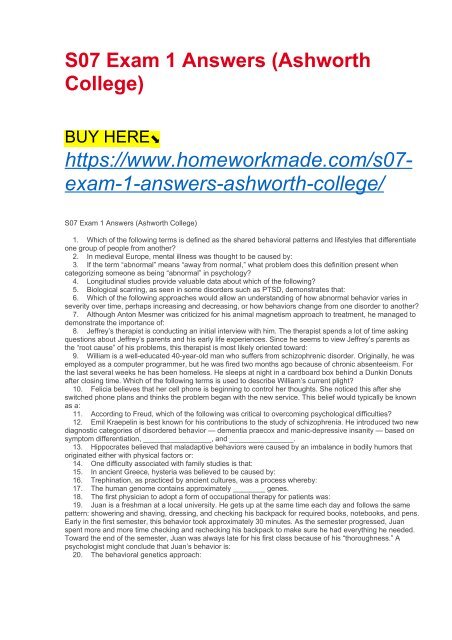S07 Exam 1 Answers (Ashworth College)
- No tags were found...
You also want an ePaper? Increase the reach of your titles
YUMPU automatically turns print PDFs into web optimized ePapers that Google loves.
<strong>S07</strong> <strong>Exam</strong> 1 <strong>Answers</strong> (<strong>Ashworth</strong><br />
<strong>College</strong>)<br />
BUY HERE⬊<br />
https://www.homeworkmade.com/s07-<br />
exam-1-answers-ashworth-college/<br />
<strong>S07</strong> <strong>Exam</strong> 1 <strong>Answers</strong> (<strong>Ashworth</strong> <strong>College</strong>)<br />
1. Which of the following terms is defined as the shared behavioral patterns and lifestyles that differentiate<br />
one group of people from another?<br />
2. In medieval Europe, mental illness was thought to be caused by:<br />
3. If the term “abnormal” means “away from normal,” what problem does this definition present when<br />
categorizing someone as being “abnormal” in psychology?<br />
4. Longitudinal studies provide valuable data about which of the following?<br />
5. Biological scarring, as seen in some disorders such as PTSD, demonstrates that:<br />
6. Which of the following approaches would allow an understanding of how abnormal behavior varies in<br />
severity over time, perhaps increasing and decreasing, or how behaviors change from one disorder to another?<br />
7. Although Anton Mesmer was criticized for his animal magnetism approach to treatment, he managed to<br />
demonstrate the importance of:<br />
8. Jeffrey’s therapist is conducting an initial interview with him. The therapist spends a lot of time asking<br />
questions about Jeffrey’s parents and his early life experiences. Since he seems to view Jeffrey’s parents as<br />
the “root cause” of his problems, this therapist is most likely oriented toward:<br />
9. William is a well-educated 40-year-old man who suffers from schizophrenic disorder. Originally, he was<br />
employed as a computer programmer, but he was fired two months ago because of chronic absenteeism. For<br />
the last several weeks he has been homeless. He sleeps at night in a cardboard box behind a Dunkin Donuts<br />
after closing time. Which of the following terms is used to describe William’s current plight?<br />
10. Felicia believes that her cell phone is beginning to control her thoughts. She noticed this after she<br />
switched phone plans and thinks the problem began with the new service. This belief would typically be known<br />
as a:<br />
11. According to Freud, which of the following was critical to overcoming psychological difficulties?<br />
12. Emil Kraepelin is best known for his contributions to the study of schizophrenia. He introduced two new<br />
diagnostic categories of disordered behavior — dementia praecox and manic-depressive insanity — based on<br />
symptom differentiation, _________________, and ________________.<br />
13. Hippocrates believed that maladaptive behaviors were caused by an imbalance in bodily humors that<br />
originated either with physical factors or:<br />
14. One difficulty associated with family studies is that:<br />
15. In ancient Greece, hysteria was believed to be caused by:<br />
16. Trephination, as practiced by ancient cultures, was a process whereby:<br />
17. The human genome contains approximately ________ genes.<br />
18. The first physician to adopt a form of occupational therapy for patients was:<br />
19. Juan is a freshman at a local university. He gets up at the same time each day and follows the same<br />
pattern: showering and shaving, dressing, and checking his backpack for required books, notebooks, and pens.<br />
Early in the first semester, this behavior took approximately 30 minutes. As the semester progressed, Juan<br />
spent more and more time checking and rechecking his backpack to make sure he had everything he needed.<br />
Toward the end of the semester, Juan was always late for his first class because of his “thoroughness.” A<br />
psychologist might conclude that Juan’s behavior is:<br />
20. The behavioral genetics approach:

















